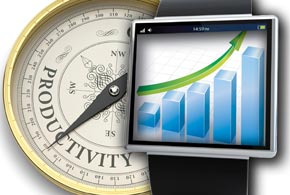
IT Leaders Give Smart Watches the Time of Day
 IT Leaders Give Smart Watches the Time of Day
IT Leaders Give Smart Watches the Time of Day
By Karen A. Frenkel
 Enterprises Want Wearables to Improve Productivity
Enterprises Want Wearables to Improve Productivity
The top five productivity drivers for company use of wearable computing and augmented reality technologies are: Improve current business processes: 48%, Gain a competitive advantage: 46%, Create new business processes: 38%, Provide levels of safety for employees: 28%, Improve or extend engagement with customers: 21%
 Of All Wearables, Smart Watches Are Favored
Of All Wearables, Smart Watches Are Favored
Asked what types of wearable devices their company plans to use in the next six months, respondents answered as follows: Smart watches: 81%, Heads-up displays/smart glasses: 54%, Fitness trackers: 28%
 Security Concerns
Security Concerns
A majority of respondents have security concerns regarding smart watches. Here are the top three: Privacy concerns for employees who are wearing devices: 50%, Theft of wearable devices for employees: 46%, Privacy concerns for customers wearing devices: 40%
 Wearable Device Policies Are Needed
Wearable Device Policies Are Needed
Companies have not yet created policies for wearable computing and augmented reality technologies. 49% said they plan to create new management and security policies. Another 49% said they plan to manage and secure wearables the way they handle smartphone and tablet security.
 IT Execs Decide About Wearables
IT Execs Decide About Wearables
IT decision-makers are in charge of wearable technology solutions. 59% of IT executives compared to 33% of executive management decide whether to purchase wearables.
 Apps and Higher-Level OS Needed
Apps and Higher-Level OS Needed
“The leap from Bluetooth-enabled accessory to intelligent, Internet-connected companion means more than adding cellular and Wi-Fi radios (though these are important as well). Software and application creation, combined with a higher level operating system, must take place for wearables to deliver real business value,” the report states.
 App Acquisition Strategies Vary
App Acquisition Strategies Vary
52% of respondents said they will build custom applications internally, 41% will buy off-the-shelf applications, and 39% will contract outside developers.
 Recommendations
Recommendations
With the rise of IoT, smart watches may be placed on the back burner as enterprises put effort into managing sensors. But smart watches present another potential avenue for hackers to access larger pools of enterprise data, and security remains a top concern.